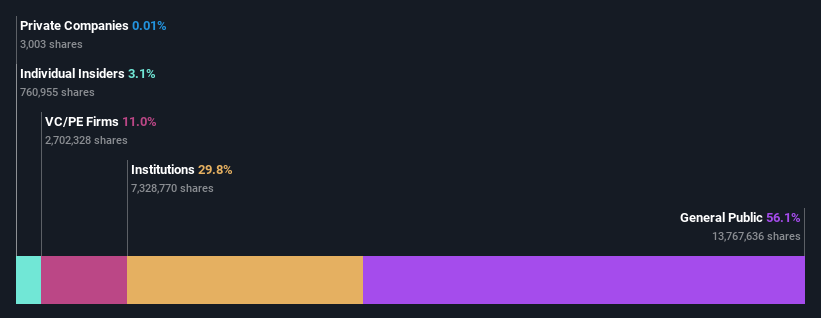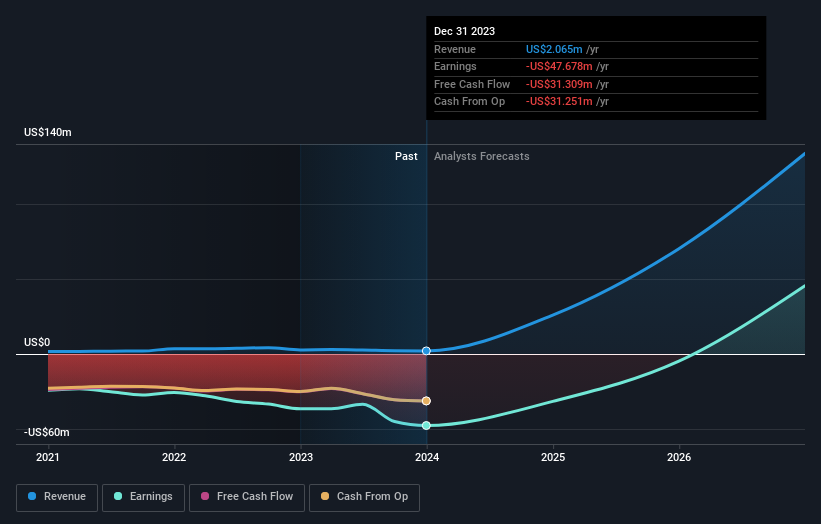Stock Analysis
- United States
- /
- Medical Equipment
- /
- NasdaqCM:DCTH
Delcath Systems, Inc.'s (NASDAQ:DCTH) 11% loss last week hit both individual investors who own 54% as well as institutions

Key Insights
- The considerable ownership by individual investors in Delcath Systems indicates that they collectively have a greater say in management and business strategy
- The top 25 shareholders own 43% of the company
- Institutions own 29% of Delcath Systems
If you want to know who really controls Delcath Systems, Inc. (NASDAQ:DCTH), then you'll have to look at the makeup of its share registry. And the group that holds the biggest piece of the pie are individual investors with 54% ownership. Put another way, the group faces the maximum upside potential (or downside risk).
While institutions, who own 29% shares weren’t spared from last week’s US$9.0m market cap drop, individual investors as a group suffered the maximum losses
In the chart below, we zoom in on the different ownership groups of Delcath Systems.
Check out our latest analysis for Delcath Systems

What Does The Institutional Ownership Tell Us About Delcath Systems?
Many institutions measure their performance against an index that approximates the local market. So they usually pay more attention to companies that are included in major indices.
Delcath Systems already has institutions on the share registry. Indeed, they own a respectable stake in the company. This suggests some credibility amongst professional investors. But we can't rely on that fact alone since institutions make bad investments sometimes, just like everyone does. It is not uncommon to see a big share price drop if two large institutional investors try to sell out of a stock at the same time. So it is worth checking the past earnings trajectory of Delcath Systems, (below). Of course, keep in mind that there are other factors to consider, too.

We note that hedge funds don't have a meaningful investment in Delcath Systems. The company's largest shareholder is Vivo Capital, LLC, with ownership of 11%. In comparison, the second and third largest shareholders hold about 6.3% and 4.8% of the stock. Furthermore, CEO Gerard Michel is the owner of 1.2% of the company's shares.
A deeper look at our ownership data shows that the top 25 shareholders collectively hold less than half of the register, suggesting a large group of small holders where no single shareholder has a majority.
Researching institutional ownership is a good way to gauge and filter a stock's expected performance. The same can be achieved by studying analyst sentiments. There are plenty of analysts covering the stock, so it might be worth seeing what they are forecasting, too.
Insider Ownership Of Delcath Systems
While the precise definition of an insider can be subjective, almost everyone considers board members to be insiders. Management ultimately answers to the board. However, it is not uncommon for managers to be executive board members, especially if they are a founder or the CEO.
I generally consider insider ownership to be a good thing. However, on some occasions it makes it more difficult for other shareholders to hold the board accountable for decisions.
We can see that insiders own shares in Delcath Systems, Inc.. As individuals, the insiders collectively own US$3.6m worth of the US$120m company. This shows at least some alignment, but we usually like to see larger insider holdings. You can click here to see if those insiders have been buying or selling.
General Public Ownership
The general public, who are usually individual investors, hold a substantial 54% stake in Delcath Systems, suggesting it is a fairly popular stock. This size of ownership gives investors from the general public some collective power. They can and probably do influence decisions on executive compensation, dividend policies and proposed business acquisitions.
Private Equity Ownership
With an ownership of 11%, private equity firms are in a position to play a role in shaping corporate strategy with a focus on value creation. Some might like this, because private equity are sometimes activists who hold management accountable. But other times, private equity is selling out, having taking the company public.
Next Steps:
While it is well worth considering the different groups that own a company, there are other factors that are even more important. For instance, we've identified 2 warning signs for Delcath Systems (1 is a bit concerning) that you should be aware of.
Ultimately the future is most important. You can access this free report on analyst forecasts for the company.
NB: Figures in this article are calculated using data from the last twelve months, which refer to the 12-month period ending on the last date of the month the financial statement is dated. This may not be consistent with full year annual report figures.
Valuation is complex, but we're helping make it simple.
Find out whether Delcath Systems is potentially over or undervalued by checking out our comprehensive analysis, which includes fair value estimates, risks and warnings, dividends, insider transactions and financial health.
View the Free AnalysisHave feedback on this article? Concerned about the content? Get in touch with us directly. Alternatively, email editorial-team (at) simplywallst.com.
This article by Simply Wall St is general in nature. We provide commentary based on historical data and analyst forecasts only using an unbiased methodology and our articles are not intended to be financial advice. It does not constitute a recommendation to buy or sell any stock, and does not take account of your objectives, or your financial situation. We aim to bring you long-term focused analysis driven by fundamental data. Note that our analysis may not factor in the latest price-sensitive company announcements or qualitative material. Simply Wall St has no position in any stocks mentioned.
About NasdaqCM:DCTH
Delcath Systems
Delcath Systems, Inc., an interventional oncology company, focuses on the treatment of primary and metastatic liver cancers in the United States and Europe.
Flawless balance sheet with high growth potential.

